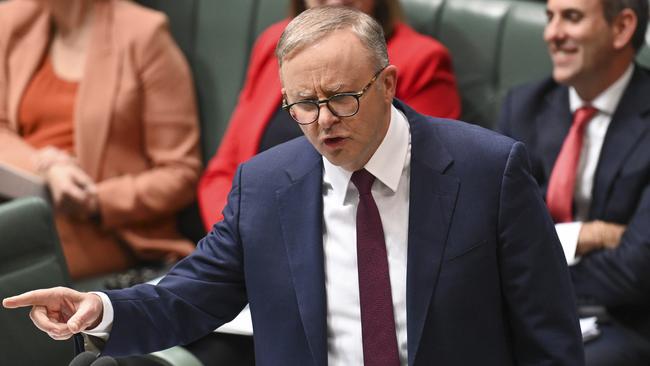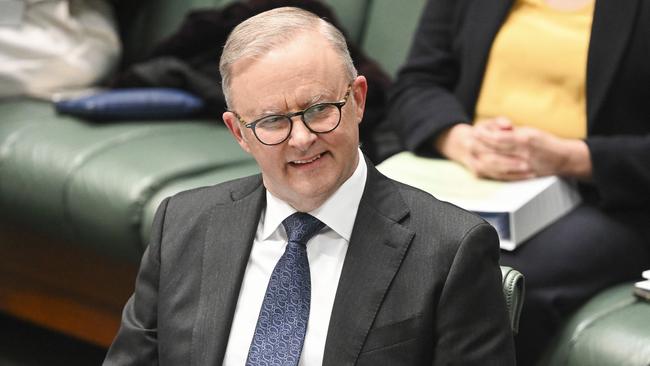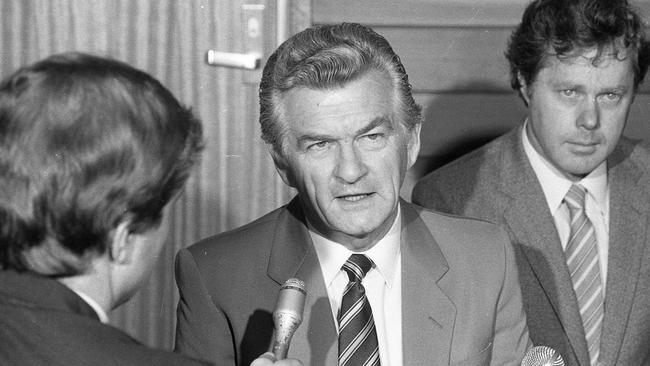James Morrow: Albo’s Voice grows weaker as energy runs out of steam
Australians, having some of the most advanced BS detectors on the planet, are increasingly not buying Albo’s big Voice push, writes James Morrow.
Opinion
Don't miss out on the headlines from Opinion. Followed categories will be added to My News.
Anthony Albanese has two problems, both largely of his own making.
The first and most obvious is the Voice.
The second problem, and one potentially more dangerous for the country, is energy and the cost of living and the government’s loss of social license and support for its kamikaze-like push for net zero combined.
Both issues have played out in parliament this week.
As an idea, an Aboriginal Voice to Parliament has been kicking around for years but the prime minister took ownership of it when he made implementing the Uluru Statement his very first promise when he stood up before a crowd of cheering supporters on election night.
The political logic must have seemed irresistible, given the idea’s potential chance to smash opponents as bigots, divide the Coalition and cement Albanese’s own “Redfern Speech” legacy.

But Australians, having some of the most advanced BS detectors on the planet, are increasingly not buying.
Telling voters the Voice has nothing to do with truth or treaty or “makaratta” or reparations does not fly with all but the most committed Yes voters, who are either happy to ignore the inconsistencies or are, in fact, in favour of all of the above.
Neither Peter Dutton nor the Coalition nor the “No” campaign is responsible for the fact that it is not conservatives spinning and obfuscating the truth here but Labor.
The PM may claim that the Uluru Statement from the Heart is a simple one-page document, but it sits with a much larger document that is full of separatism and grievance and pleas for reparations and alternate sovereignty arrangements.
It also envisions a future “makaratta” commission that would sit above the parliament and the government to make deals with Aboriginal Australians.
On the subject of makaratta, while the PM might claim (as he did on the flood of parliament on Monday) that the word “is about promoting reconciliation” and “coming together after conflict,” there are other interpretations of the word.
In 2017, Merrikiyawuy Ganambarr-Stubbs told the ABC’s Radio National that while the word’s “main” meaning is “peace after a dispute”, the peace it envisions is a bloody one.

“Makarrata literally means a spear penetrating, usually the thigh, of a person that has done wrong … so that they cannot hunt anymore, that they cannot walk properly, that they cannot run properly; to maim them, to settle them down, to calm them — that’s Makarrata,” she said.
This is why so many people are suspicious and why concerns about WA’s updated Indigenous Heritage Laws have been so contentious: No one expects a successful Voice to draw a line under future claims.
If anything, it is likely to amplify them, which is why in poll after poll Australians appear to be ready to say “no”. But even so, a failed referendum may be better than a successful (if that is the right word) energy policy.
Bob Hawke, after all, survived something like six referendum questions going down on his watch.
Yet it is in the field of energy that the real danger lies.
Also on Monday, the prime minister tried to take credit for falling energy prices, telling the House of Representatives: “Wholesale electricity prices (were) $264 a megawatt in the June quarter of 2022. Now, it’s $108 … gas was $31.76 in May 2022, the August average is $10.73.”
All of that must have struck readers who recently received chirpy letters from their power providers indicating their bills would go up by 25 per cent or more from July 1 as a bit of surprise.

It certainly puts paid to the idea that the government’s relentless drive to push coal and gas out of the network, and the propaganda it puts out about the low cost nature of same, needs a second look.
Energy experts are now calling out the assumptions behind the CSIRO’s assumptions that renewables are always cheaper, and the way such assumptions ignore such things as the cost of “firming” wind and solar when the wind doesn’t blow and the sun doesn’t shine.
Combine this with the increasing drumbeat of reports about the environmental havoc wreaked by solar and wind farms in places like Queensland, and the reporting in this newspaper about the divisions being caused in the bush by renewable energy projects, and it would seem Albanese and Chris Bowen’s energy policies are coming up against the brick wall of reality.
Both issues suggest, if not a failure to do the homework, then failure to properly test ideas. They also suggest that the PM has been let down by his ministers in both portfolios.
Bowen seems incapable of much more than glibly parroting lines about renewables being the cheapest form of energy.
Linda Burney, in the Indigenous Affairs portfolio, likewise has shown herself unable to prosecute anything more than pre-prepared key messages amid the cut and thrust of parliament.
The first issue may be taking up most of this column as well as most of the government’s time in parliament.
But after the Voice vote is held, win or lose, it is that second question of keeping the lights on affordably that will become the first order issue.





